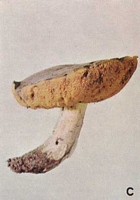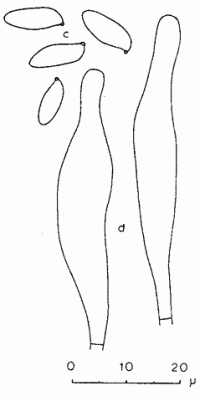|
 Xerocomus griseoolivaceus Xerocomus griseoolivaceus
BiostatusPresent in region - Indigenous. Endemic
Images (click to enlarge)
Caption: Fig. 8 - c, Xerocomus griseo-olivaceous (x1) | 
Caption: Fig. 2 - c, d, X. griseo-olivaceus: c, spores; d, cystidia. |
Article: McNabb, R.F.R. (1968). The Boletaceae of New Zealand. New Zealand Journal of Botany 6(2): 137-176 (http://www.rsnz.org/publish/abstracts.php).
Description: PILEUS: plano-convex
to applanate, 3.5-6.5 cm diam., dry, tomentose to subvelutinate, greyish fawn
to greyish with olivaceous tints; cuticle a trichodermium, composed of erect,
branched, septate hyphae 5-10 µm. diam., terminal cells rounded or bluntly acuminate,
often with brownish contents; margin entire. HYMENOPHORE: tubes to 4 mm long,
adnate or slightly excavated around apex of stipe, deep golden yellow to orange
yellow at maturity; pores concolorous with tubes or discoloured reddish brown
in places, angular, 0.5-0.75 mm diam., occasionally radially elongated near
apex of stipe. STIPE: 3-5 cm long, more or less equal, 0.8-1 cm diam., solid,
fibrous, dry, subglabrous to finely granular or furfuraceous by aggregation
of caulocystidia, occasionally finely and obscurely fibrillose. Sordid white
to greyish white, often with brownish stains; flesh sordid white; annulus absent.
SPORES: spore print
olive brown (Isabella Color); spores pallid melleous, elliptic-subfusiform,
8.4-10.4-(11) x 3.9-4.5 µm., smooth. HYMENIUM: basidia hyaline, clavate, 25-33.5
X 7-9-8 µm, 4-spored; cystidia sparse, scattered, hyaline, thin-walled, ventricose-rostrate,
42-60 x 8-11.5 µm. HYMENOPHORAL TRAMA: bilateral, of the Phylloporus
subtype; clamp connections absent. CONTEXT OF PILEUS: sordid white, unchanging
on exposure to air. TASTE AND SMELL: not distinctive. CHEMICAL REACTIONS: KOH
and NH4OH on pileus and context of pileus—no definite reaction.
|